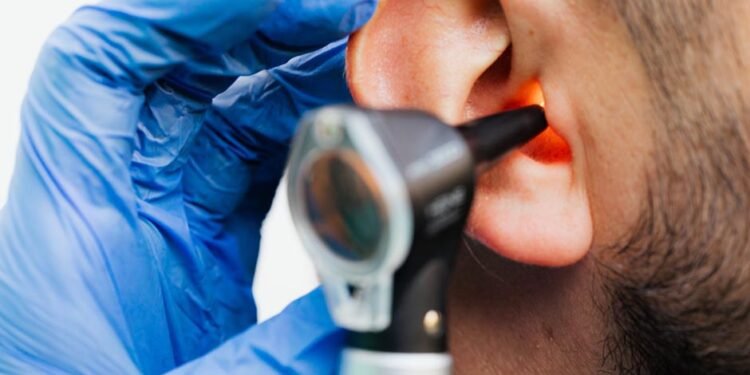In the world of medical advancements, hope often mingles with concerns. There is a pressing question surrounding Tepezza, a treatment offering relief for thyroid eye disease (TED). Its efficacy in alleviating such disease is undisputed, yet recent whispers of hearing-related issues urge people to scrutinize its broader impact.
A pertinent concern may echo in your mind: is recovery possible if Tepezza poses a risk to hearing? The significance of this inquiry lies in the delicate balance between medical progress and potential setbacks.
This article delves into the intricacies, aiming to present insight into the intersection of Tepezza and hearing loss.
Tepezza and Its Use
Tepezza, also known as teprotumumab, has emerged as a beacon of hope for individuals grappling with TED. It’s a condition marked by inflammation and swelling of the eyes.
It works by inhibiting the activity of insulin-like growth factor-1 receptor (IGF-1R), a key player in the development of the disorder. Doing so mitigates the disease’s debilitating symptoms, offering relief to many.
Typically administered through a series of intravenous infusions over several months, it has demonstrated efficacy in reducing eye bulging. It also has been shown to alleviate pain associated with it. The treatment, therefore, is known for improving the quality of life for patients’ physical and emotional toll of the disease. Recent concerns, however, have surfaced regarding its potential connection to hearing loss.
Understanding Tepezza-Related Hearing Loss
Understanding the potential link between Tepezza and hearing loss requires a closer look at the intricate mechanisms at play. While its primary purpose is to combat TED, recent reports have raised concerns about its association with auditory issues. Patients undergoing Tepezza treatment have reported symptoms ranging from mild hearing impairment to more severe cases, according to TorHoerman Law.
Therefore, it’s critical to recognize the increasing number of people who have had post-treatment hearing-related issues as the Tepezza lawsuit landscape develops. These cases highlight the need for a comprehensive examination of its side effects. Individuals who have subsequently faced hearing challenges may find themselves grappling with uncertainties.
Thus, navigating these complexities demands a nuanced understanding of the medical and legal aspects.
It becomes evident that a comprehensive understanding is essential for those impacted and the broader community considering or undergoing similar treatments.
Recovery Possibilities
While the exact mechanisms behind this potential side effect remain under scrutiny, some individuals have reported improvements in hearing after discontinuing Tepezza treatment. This observation raises intriguing questions about the reversibility of hearing issues associated with the drug.
Recovery possibilities hinge on the assumption that Tepezza-induced hearing loss is reversible, an aspect yet to be conclusively established through rigorous scientific investigation. Physicians may recommend discontinuation of the treatment or adjustments to dosage, depending on the individual’s response and overall health.
Medical Assessment and Intervention
Individuals experiencing changes in their hearing while undergoing Tepezza treatment should promptly consult their healthcare providers. A comprehensive evaluation is crucial to determine the nature and extent of the hearing impairment. It allows for informed decision-making regarding the continuation or modification of its therapy.
Medical specialists may conduct various tests, including audiological assessments and imaging studies, to understand the specific characteristics of hearing loss. This diagnostic process helps distinguish Tepezza-related issues from other potential causes, contributing to a more precise and targeted intervention strategy.
If deemed necessary, interventions can vary based on the individual’s unique circumstances. Government authorities can also play a huge role in this. For instance, according to Ophthalmology Breaking News, the FDA has updated the medication’s warning label after receiving complaints of hearing impairments.
The drug’s precautionary and warning section now references “severe hearing impairment, including hearing loss,” which is one of the significant revisions made to the label.
The FDA’s intervention follows an increasing number of litigations that Horizon Pharmaceuticals is facing. It claims that the possibility of hearing problems with its injections was not sufficiently disclosed in the original warning labeling. In this sense, the knowledge will be vital in helping you make the right decisions regarding giving the medication.
Ongoing Research and Studies
Scientists and healthcare specialists are actively engaged in comprehensive investigations to discern the precise connections. The dynamic nature of medical research means that your understanding is continually expanding, bringing forth new insights and avenues for exploration.
Current studies aim to elucidate whether Tepezza-induced hearing issues are reversible and the underlying mechanisms at play. Researchers are examining a range of factors. These include the duration of treatment, dosage levels, and individual patient characteristics. It creates a more nuanced picture of the potential risks and recovery possibilities.
In this regard, a significant finding from the drug’s clinical investigations and research was published by Eyewire News this year. It clarifies the relationship between autoimmune thyroid diseases and hearing risks. The findings demonstrate a strong correlation between these two factors, providing insight into how thyroid autoimmunity affects hearing health.
It has been established that hearing loss occurs in individuals with Graves’ illness with Tepezza treatment, especially at high frequencies. This finding was of significance since it came from the two investigations that were presented at the Endocrine Society Annual Meeting.
The collaborative efforts of the medical community are instrumental in enhancing your comprehension of its safety profile and refining treatment guidelines. These ongoing studies not only contribute to the scientific understanding of the medication but also hold the promise of informing future treatment strategies.
Managing Expectations
The current understanding of Tepezza’s impact on hearing is still evolving, and definitive conclusions may take time. Patients and healthcare providers alike should engage in open and transparent communication to foster a shared understanding of the risks and benefits associated.
It’s essential to acknowledge that each individual’s response to Tepezza can vary, and recovery possibilities may differ. Setting realistic expectations involves recognizing the uncertainties inherent in the current scientific understanding. Also, being prepared for potential adjustments to the treatment plan based on ongoing assessments.
Apart from managing expectations, patients should also pay attention to their responsibility. When receiving the drug, patients ought to utilize extra precautions, according to Drug Watch. Attaining self-knowledge and having an understanding of how it works and when not to use it is key here.
For instance, it is not advisable to use it when expecting. Contraception is advised before beginning medication, throughout treatment, and for six months following the last dosage.
Patients with diabetes or those with impaired glucose tolerance who use Tepezza should be properly watched. In those who have had diabetes in the past, it has been shown to cause hyperglycemia. As a result, one also has to be aware of the infusion reactions. Adverse effects, including elevated blood pressure, warmth sensation, rapid heartbeat, and muscle soreness, may come into play.
While concerns about hearing loss can be unsettling, proactive communication with healthcare specialists is, therefore, a key component of managing expectations.
Conclusion
With Tepezza’s hearing concerns, uncertainties persist, underscoring the importance of informed decisions and ongoing dialogue between patients and healthcare providers. While research explores recovery possibilities, managing expectations becomes paramount.
Each individual’s response may vary, urging personalized approaches. Vigilance, open communication, and collaborative efforts define this journey, emphasizing the need for a balanced perspective.












